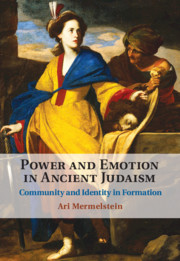Book contents
- Power and Emotion in Ancient Judaism
- Power and Emotion in Ancient Judaism
- Copyright page
- Dedication
- Contents
- Acknowledgments
- Abbreviations
- Introduction Power and Emotion in Ancient Judaism
- Part I Jewish Emotional Resistance to Gentile Power-Over in the Greco-Roman Diaspora
- Part II Jewish Emotion Discourse in Response to Divine Power-Over
- 4 Overcoming Divine Power-Over
- 5 Coping with Divine Power-Over
- Part III The Dead Sea Sect As Emotional Community
- Conclusion
- Bibliography
- Primary Source Index
- Modern Author Index
- Subject Index
4 - Overcoming Divine Power-Over
Righteous Anger in 1 Maccabees
from Part II - Jewish Emotion Discourse in Response to Divine Power-Over
Published online by Cambridge University Press: 04 June 2021
- Power and Emotion in Ancient Judaism
- Power and Emotion in Ancient Judaism
- Copyright page
- Dedication
- Contents
- Acknowledgments
- Abbreviations
- Introduction Power and Emotion in Ancient Judaism
- Part I Jewish Emotional Resistance to Gentile Power-Over in the Greco-Roman Diaspora
- Part II Jewish Emotion Discourse in Response to Divine Power-Over
- 4 Overcoming Divine Power-Over
- 5 Coping with Divine Power-Over
- Part III The Dead Sea Sect As Emotional Community
- Conclusion
- Bibliography
- Primary Source Index
- Modern Author Index
- Subject Index
Summary
In the previous three chapters, we have focused on emotional resistance to the hegemonic emotion discourse of empire and gentile power-over. In this and the next chapter, we turn to the role of emotion in response to divine power-over in cases where divine power was especially obvious to ancient Jews: national tragedy and loss. Overcoming the tragedy of the Antiochan persecutions, the subject of this chapter, and the destruction of the Second Temple, the subject of the next one, required an emotion discourse that would help repair relations with God, neutralize the effects of divine power-over, and restore their own power to achieve redemption. The emotion discourses proposed by Jewish writers at the time were uniquely Jewish because they reflected beliefs about the covenant and God’s relationship with the Jews – affirmations that were necessary in order for God to restore the power of the Jews to attain salvation.
- Type
- Chapter
- Information
- Power and Emotion in Ancient JudaismCommunity and Identity in Formation, pp. 115 - 131Publisher: Cambridge University PressPrint publication year: 2021

